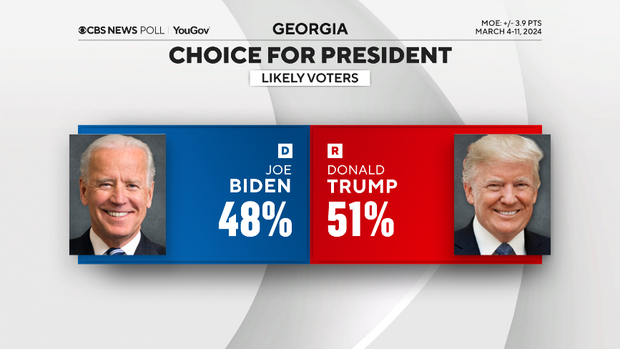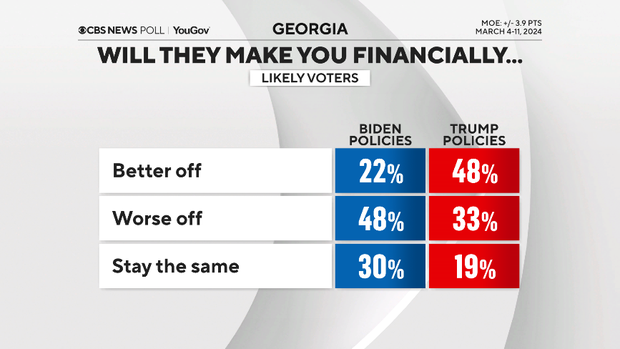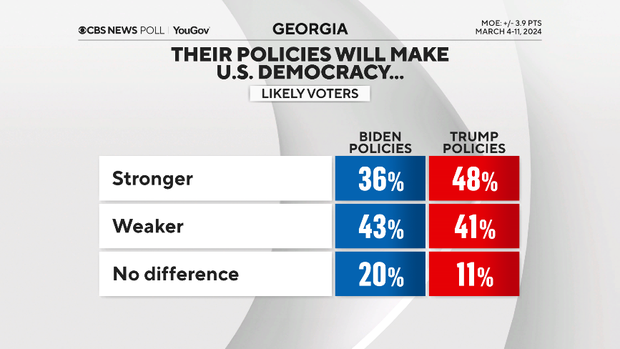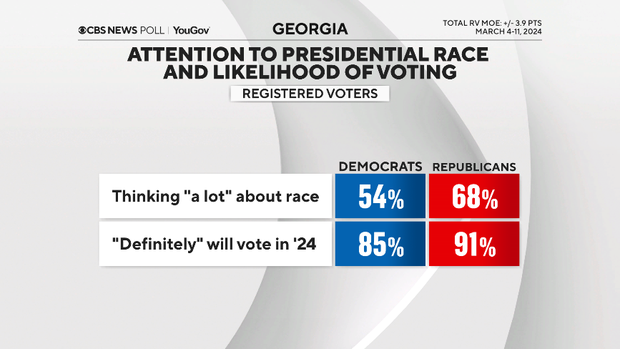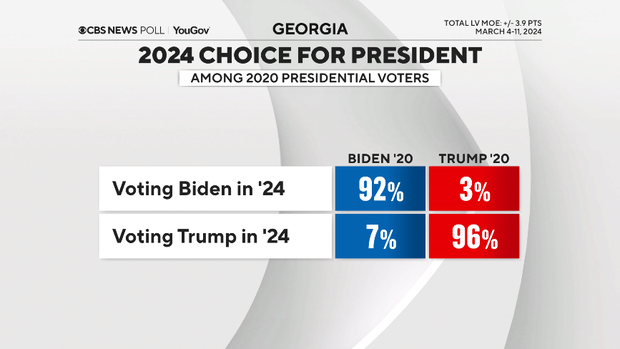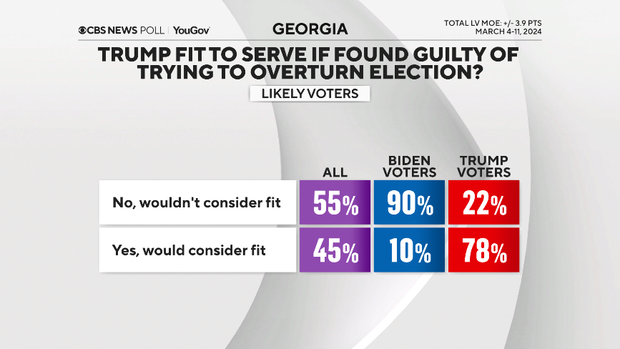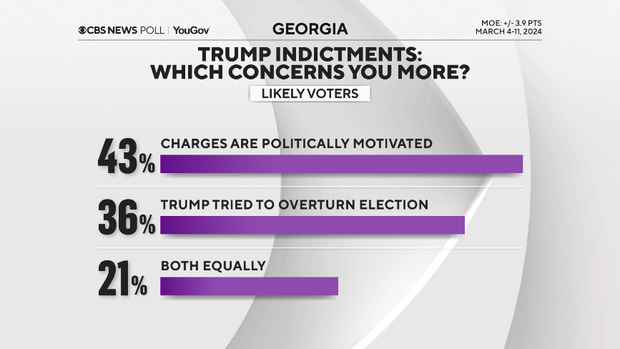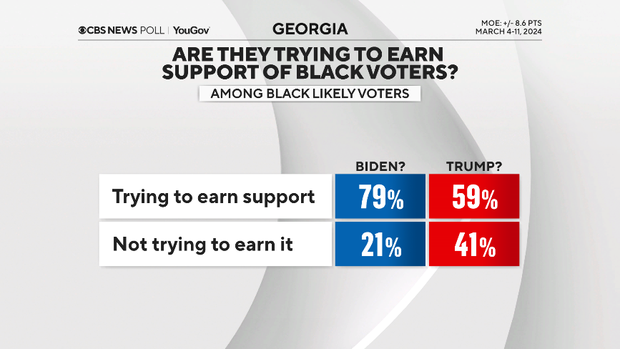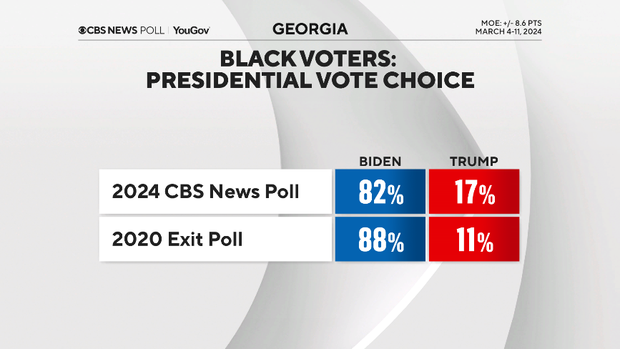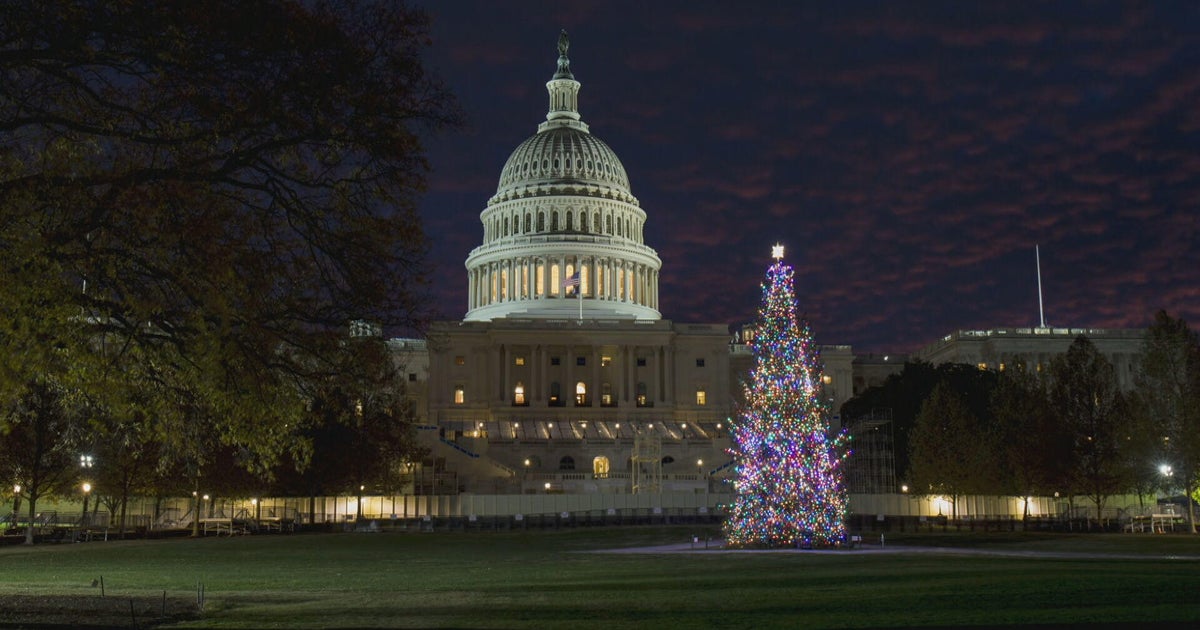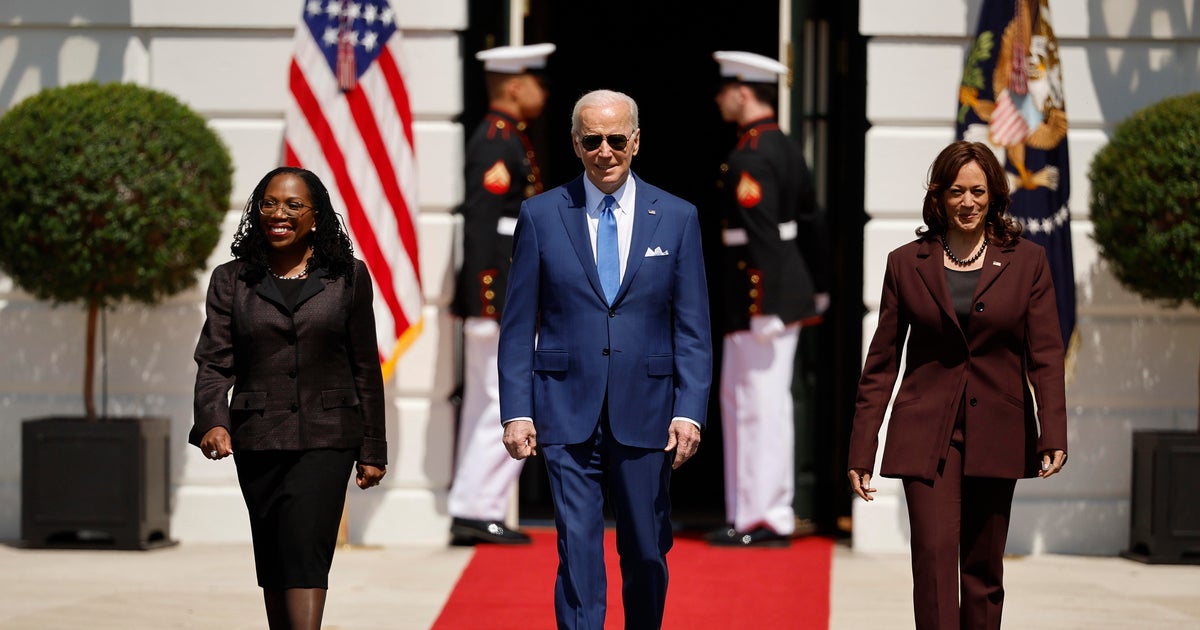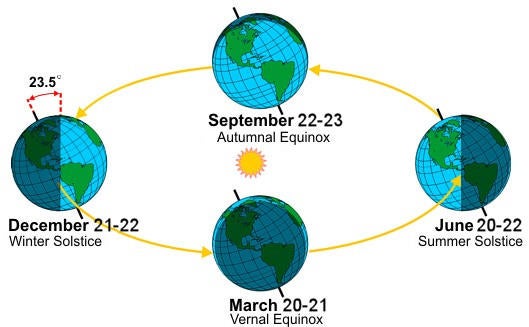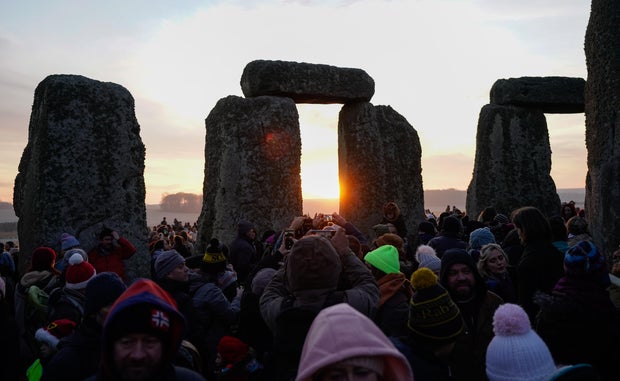CBS News
Trump leads Biden narrowly in Georgia as general election comes into focus — CBS News Battleground poll
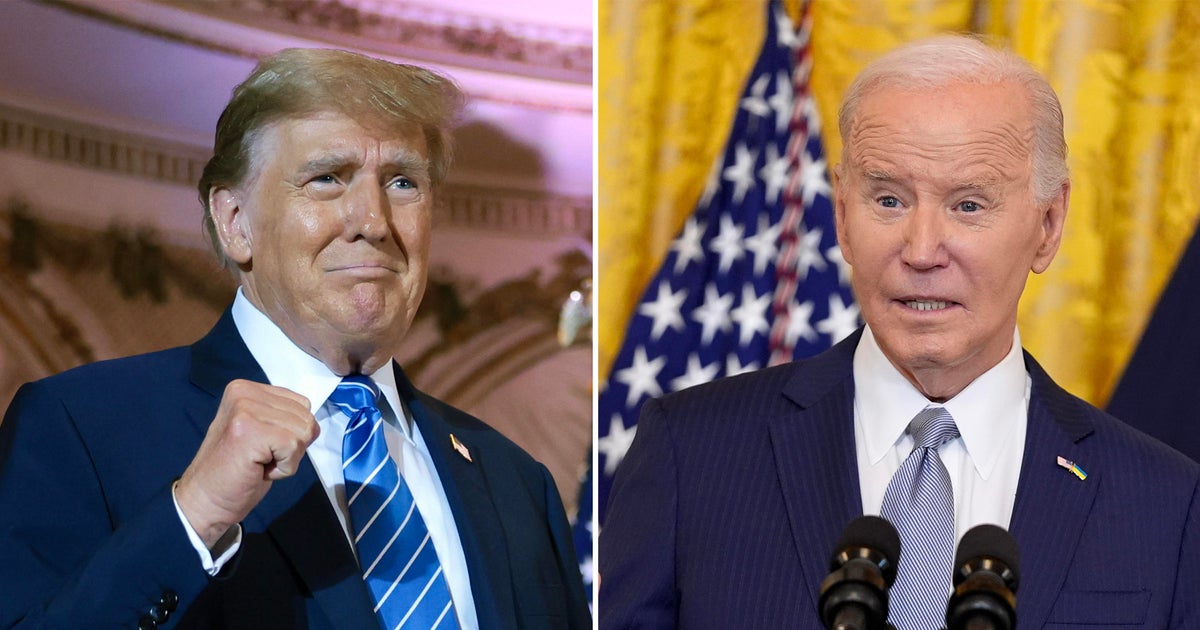
With President Biden and Donald Trump on the verge of clinching the presidential nomination, their rematch in Georgia in the general election looks like another close race. Trump is just ahead of Mr. Biden in likely voters’ current preferences, with a three-point lead that is within the margin of error. This edge is driven by a small group of Mr. Biden’s 2020 voters switching to Trump, boosted by favorable views of how Trump’s policies would affect Georgians’ pocketbooks.
The president’s message in his State of the Union address that democracy is under threat at home may resonate with Democrats, but voters in Georgia are likelier to say it’s Trump than Mr. Biden who would strengthen U.S. democracy. In fact, Mr. Biden’s numbers on this issue are net negative, with a third of his own voters saying his second-term policies wouldn’t make a difference.
Trump’s numbers on democracy are driven by his own voters, many of whom still believe there was widespread voter fraud in Georgia in 2020. Another reason Trump’s backers might give him the edge on democracy is the widespread feeling among them that the charges and indictments against him are politically motivated.
Democrats are also trying to raise the salience of abortion access after the Dobbs decision, keeping it on voters’ radars. A majority of Georgia voters would prefer abortions in the state to be mostly, if not entirely, legal, but they are by no means all voting Democratic. About three in 10 of them currently prefer Trump to Mr. Biden, but this is another group to watch as the campaign unfolds.
At the same time, most say that Mr. Biden is not focused enough on inflation and the U.S.-Mexico border, and these views are correlated with voting intentions. Biden 2020 voters who don’t think he’s paying enough attention to these issues are more likely to be backing Trump today than those who say Mr. Biden’s focus is about right.
Persuasion and turnout
In 2020, Georgia went blue for the first time in decades, albeit very narrowly, with Mr. Biden beating Trump by under 12,000 votes — about a quarter of a percentage point.
There is a turnout gap emerging early on, setting up a campaign not just of persuasion, but also motivation: Republicans and Trump 2020 voters are likelier than Democrats and Biden 2020 voters to say they will “definitely” vote.
And Republicans are currently thinking about the race more than Democrats.
Most voters here already report thinking about the presidential race “a lot” — perhaps partly due to the primaries occurring now. And while the vast majority of voters are planning to turn out this fall. This six-point turnout gap results in a likely 2024 electorate with a slightly higher share of Trump ’20 voters.
On top of that, more Biden ’20 voters than Trump ’20 voters are now thinking of voting for the other party. To be clear, these voters constitute small but highly consequential slivers of the electorate. And Trump’s current lead is more attributable to persuasion than differential turnout.
Trump indictments
The lion’s share of Trump’s backers would still consider him fit for the presidency if he were eventually found guilty of trying to overturn the 2020 election. (This is also the case among Trump’s primary voters in recent GOP nominating contests.) About one in five of his supporters in Georgia say they wouldn’t consider him fit if he were found guilty by a court.
Could a conviction, if it happened, change any minds? The evidence is mixed. Trump voters who say they wouldn’t consider him fit don’t have positive evaluations for Mr. Biden, and they also express concerns about Mr. Biden’s mental and physical fitness. This group may be asked to pick between two men they consider unfit for the job, albeit for different reasons.
Overall, voters across the state are more mixed on the Trump charges. There is slightly more concern that the charges are politically motivated than concern that he actually tried to overturn the election. But most say they wouldn’t consider him fit to be president if he were found guilty.
Who is switching?
One of the more noticeable shifts comes from the diverse suburbs around Atlanta. Voters in this competitive part of the state were critical to Mr. Biden’s success four years ago, but they now lean Trump’s way.
More generally, Trump’s support has improved a bit among voters of color. While the gains are modest and Mr. Biden still has a big lead among them, every potential blue-to-red switch matters in a close race.
Most Black voters feel Trump is trying to earn Black support. Black voters make up nearly a third of Georgia’s electorate, and 17% of them today are picking Trump over Mr. Biden — that’s a modest improvement from Trump’s 2020 showing in the state. Mr. Biden’s path to victory in the state relies on maintaining dominant margins among this key group. This is a key group to watch, because it would be much harder for the president to replicate his 2020 performance if more of them switch their support, or if a substantial segment of Black voters aren’t motivated to turn out this year.
Aside from voters of color, voters under 50 and men who voted for Mr. Biden four years ago are the likelier groups to be considering switching to Trump. Switching to Trump is also more prevalent among self-described moderates and independents, as well as voters who say Mr. Biden winning wouldn’t make a difference to the strength of U.S. democracy.
Our data also shows some of the challenges ahead for the Biden campaign: mobilize more voters in these key segments of their 2020 coalition to turn out and back the president again, or at least, cast a vote against Trump. These challenges become more difficult if swing voters are more focused on inflation and pocketbook issues than on larger themes of democracy and rights.
Unlike national economic sentiment, views of Georgia’s economy are net positive among voters in the state. And Gov. Brian Kemp enjoys very positive evaluations from voters, with about two thirds approving of the job he is doing. That includes roughly half of Democratic voters.
This CBS News/YouGov survey was conducted with a statewide representative sample of 1,133 registered voters in Georgia interviewed between March 4-11, 2024. The sample was weighted according to gender, age, race, education and geographic region, based on U.S. Census data and voter files, as well as to past vote. The margin of error is ±3.9 points.
CBS News
12/20: CBS Evening News – CBS News

Watch CBS News
Be the first to know
Get browser notifications for breaking news, live events, and exclusive reporting.
CBS News
Saturday is the winter solstice and 2024’s shortest day. Here’s what to know about the official start of winter.

The 2024 winter solstice, the shortest day of the year, happens on Saturday, Dec. 21, in the Northern Hemisphere. The celestial event signifies the first day of winter, astronomically.
What is the winter solstice?
The winter solstice is the day each year that has the shortest period of daylight between sunrise and sunset, and therefore the longest night. It happens when the sun is directly above the Tropic of Capricorn, a line of latitude that circles the globe south of the equator, the National Weather Service explains.
The farther north you are, the shorter the day will be, and in the Arctic Circle, the sun won’t rise at all.
How is the day of the winter solstice determined?
The winter solstice occurs because of the Earth’s tilt as it rotates around the sun.
When the Northern Hemisphere tilts away from the sun, the nights last longer. The longest night happens on the solstice because the hemisphere is in its furthest position from the sun. That occurs each year on Dec. 21 or 22.
This year, it falls on Dec. 21 at 4:21 a.m ET, to be precise.
On the summer solstice, when the northern tilt is closest to the sun, we have the longest day, usually June 20 or 21.
National Weather Service
The solstices are not always exactly on the 21st every year because the earth’s rotation around the sun is 365.25 days, instead of 365 even.
Will days start getting longer after the winter solstice?
Yes. Each day after the solstice, we get one minute more of sunlight. It doesn’t sound like much, but after just two months, or around 60 days, we’ll be seeing about an hour more of sunlight.
When will winter officially be over in 2025?
The meteorological winter ends on March 20, 2025. Then, spring will last until June 20, when the summer solstice arrives.
How is the winter solstice celebrated around the world?
Nations and cultures around the world have celebrated the solstice since ancient times with varying rituals and traditions. The influence of those solstice traditions can still be seen in our celebrations of holidays like Christmas and Hanukkah, Britannica notes.
The ancient Roman Saturnalia festival celebrated the end of the planting season and has close ties with modern-day Christmas. It honored Saturn, the god of harvest and farming. The multiple-day affair had lots of food, games and celebrations. Presents were given to children and the poor, and slaves were allowed to stop working.
Gatherings are held every year at Stonehenge, a monumental circle of massive stones in England that dates back about 5,000 years. The origins of Stonehenge are shrouded in mystery, but it was built to align with the sun on solstice days.
Andrew Matthews/PA Images via Getty Images
The Hopi, a Native American tribe in the northern Arizona area, celebrate the winter solstice with dancing, purification and sometimes gift-giving. A sacred ritual known as the Soyal Ceremony marks the annual milestone.
In Peru, people honor the return of the sun god on the winter solstice. The ancient tradition would be to hold sacrificial ceremonies, but today, people hold mock sacrifices to celebrate. Because Peru is in the Southern Hemisphere, their winter solstice happens in June, when the Northern Hemisphere is marking its summer solstice.
Scandinavia celebrates St. Lucia’s Day, a festival of lights.
The “arrival of winter,” or Dong Zhi, is a Chinese festival where family gathers to celebrate the year so far. Traditional foods include tang yuan, sweet rice balls with a black sesame filling. It’s believed to have its origins in post-harvest celebrations.
Researchers stationed in in Antarctica even have their own traditions, which may include an icy plunge into the polar waters. They celebrate “midwinter” with festive meals, movies and sometimes homemade gifts.
CBS News
12/20: CBS News Weekender – CBS News

Watch CBS News
Be the first to know
Get browser notifications for breaking news, live events, and exclusive reporting.


